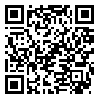Volume 9, Issue 3 (Autumn 2023)
J Health Res Commun 2023, 9(3): 29-38 |
Back to browse issues page
Download citation:
BibTeX | RIS | EndNote | Medlars | ProCite | Reference Manager | RefWorks
Send citation to:



BibTeX | RIS | EndNote | Medlars | ProCite | Reference Manager | RefWorks
Send citation to:
Fallahi A, Einolahzadeh K, Zareii khiyavi R, Mohammadi S. Investigating the Effect of Communication Skills Training on Job Burnout of Healthcare Workers in Sanandaj Comprehensive Health Centers. J Health Res Commun 2023; 9 (3) :29-38
URL: http://jhc.mazums.ac.ir/article-1-881-en.html
URL: http://jhc.mazums.ac.ir/article-1-881-en.html
Associate Professor, Department of Public Health, Faculty of Health, Kurdistan University of Medical Sciences, Sanandaj, Iran
Abstract: (2658 Views)
Introduction and purpose: Despite the importance of the role of healthcare workers in the formation of health behaviors in society, job burnout is high in the dimensions of emotional exhaustion, depersonalization, and conflict in these jobs. The present study was conducted to investigate the effect of communication skills training on the burnout of healthcare workers in comprehensive health centers in Sanandaj, Iran.
Methods: This experimental study was performed in 2018 in Sanandaj, west of Iran. A total of 132 people were selected by simple random sampling and divided into an intervention group (n=66 people) and a control group (n=66 people). Data collection tool included demographic characteristics and a 25-question job burnout questionnaire. The training in the intervention group was conducted in 10 one and a half hour sessions (two sessions per week) in the form of lectures, pamphlets, and group discussions with the content of improving communication skills. The collected data was analyzed using SPSS software (version 24) and correlation, paired t-test, independent t, and ANOVA tests.
Results: A total of 66 people (57 women and 9 men) with an average age of 36.85 ± 7.85 years in the test group and 66 people (11 men and 55 women) with an average age of 36.95 ± 7.3 in the control group from healthcare workers participated in this study. Before the training, the intervention group and the control group were similar in terms of demographic characteristics (age, level of education, marital status, and employment status) and burnout dimension scores (P>0.5). However, three months after the intervention, the mean and standard deviation of the scores of emotional exhaustion, depersonalization, conflict and personal performance in the intervention group increased significantly (P<0.05).
Conclusion: Based on the findings of the present study, communication skills training effectively reduced job burnout in the three dimensions of emotional exhaustion, depersonalization, and conflict and increased the personal performance of healthcare workers.
Methods: This experimental study was performed in 2018 in Sanandaj, west of Iran. A total of 132 people were selected by simple random sampling and divided into an intervention group (n=66 people) and a control group (n=66 people). Data collection tool included demographic characteristics and a 25-question job burnout questionnaire. The training in the intervention group was conducted in 10 one and a half hour sessions (two sessions per week) in the form of lectures, pamphlets, and group discussions with the content of improving communication skills. The collected data was analyzed using SPSS software (version 24) and correlation, paired t-test, independent t, and ANOVA tests.
Results: A total of 66 people (57 women and 9 men) with an average age of 36.85 ± 7.85 years in the test group and 66 people (11 men and 55 women) with an average age of 36.95 ± 7.3 in the control group from healthcare workers participated in this study. Before the training, the intervention group and the control group were similar in terms of demographic characteristics (age, level of education, marital status, and employment status) and burnout dimension scores (P>0.5). However, three months after the intervention, the mean and standard deviation of the scores of emotional exhaustion, depersonalization, conflict and personal performance in the intervention group increased significantly (P<0.05).
Conclusion: Based on the findings of the present study, communication skills training effectively reduced job burnout in the three dimensions of emotional exhaustion, depersonalization, and conflict and increased the personal performance of healthcare workers.
Type of Study: Research(Original) |
Subject:
Health Education and Promotion
Send email to the article author
| Rights and permissions | |
 |
This work is licensed under a Creative Commons Attribution-NonCommercial 4.0 International License. |







